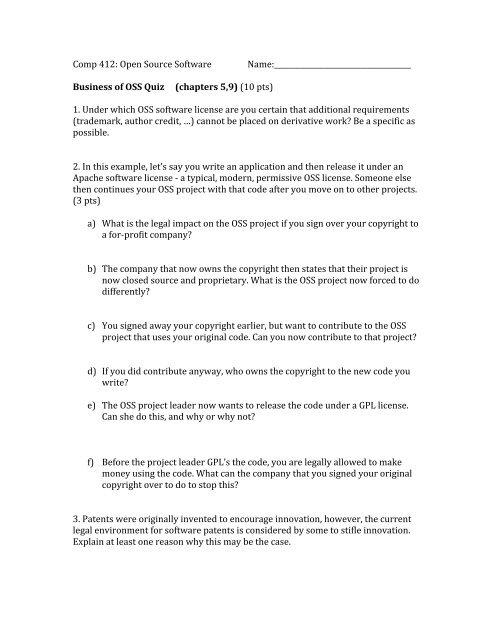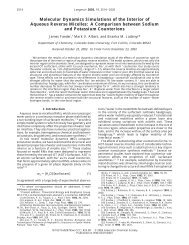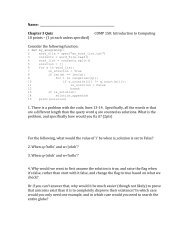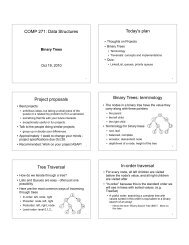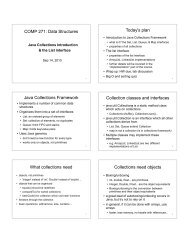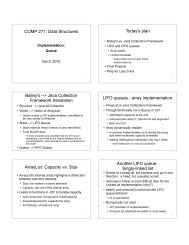Comp 412: Open Source Software Name: Business of
Comp 412: Open Source Software Name: Business of
Comp 412: Open Source Software Name: Business of
Create successful ePaper yourself
Turn your PDF publications into a flip-book with our unique Google optimized e-Paper software.
<strong>Comp</strong> <strong>412</strong>: <strong>Open</strong> <strong>Source</strong> <strong>S<strong>of</strong>tware</strong> <br />
<strong>Name</strong>:______________________________________ <br />
<strong>Business</strong> <strong>of</strong> OSS Quiz <br />
(chapters 5,9) (10 pts) <br />
1. Under which OSS s<strong>of</strong>tware license are you certain that additional requirements <br />
(trademark, author credit, …) cannot be placed on derivative work Be a specific as <br />
possible. <br />
2. In this example, let’s say you write an application and then release it under an <br />
Apache s<strong>of</strong>tware license -‐ a typical, modern, permissive OSS license. Someone else <br />
then continues your OSS project with that code after you move on to other projects. <br />
(3 pts) <br />
a) What is the legal impact on the OSS project if you sign over your copyright to <br />
a for-‐pr<strong>of</strong>it company <br />
b) The company that now owns the copyright then states that their project is <br />
now closed source and proprietary. What is the OSS project now forced to do <br />
differently <br />
c) You signed away your copyright earlier, but want to contribute to the OSS <br />
project that uses your original code. Can you now contribute to that project <br />
d) If you did contribute anyway, who owns the copyright to the new code you <br />
write <br />
e) The OSS project leader now wants to release the code under a GPL license. <br />
Can she do this, and why or why not <br />
f) Before the project leader GPL’s the code, you are legally allowed to make <br />
money using the code. What can the company that you signed your original <br />
copyright over to do to stop this <br />
3. Patents were originally invented to encourage innovation, however, the current <br />
legal environment for s<strong>of</strong>tware patents is considered by some to stifle innovation. <br />
Explain at least one reason why this may be the case.
4. Often for open source projects you hire a programmer to submit a patch rather <br />
than follow their change through until it is committed into the source code <strong>of</strong> the <br />
project. Why Why are many OSS contracts assigned for “bona fide” attempts at code <br />
inclusion, rather than having the contractor follow through to completion <br />
5. As a percentage <strong>of</strong> all OSS licenses, which type <strong>of</strong> license is becoming more <br />
prominent over time, strong copyleft or permissive licenses Explain why you <br />
believe this transition is occurring in the OSS community. <br />
6. If you do not deal explicitly with copyright issues in your OSS project through <br />
CLA’s or copyright transfer agreements, why is it critical to apply an OSS license as <br />
soon as possible <br />
7. Match the word with the concept (a one-‐to-‐one matching) (2pts) <br />
_____: Patent <br />
_____: Trademark <br />
_____: Copyright <br />
_____: GPL-‐compatible <br />
_____: Strong copyleft <br />
_____: Public domain <br />
a) Protecting the reputation <strong>of</strong> the originator <strong>of</strong> the code by either enforcing <br />
their inclusion in crediting or removing their name from a derived work. <br />
b) Unlike copyright or trademark infringement, infringing this may require <br />
more than a code rewrite (e.g. rounded corners on apps) <br />
c) Code in which the intellectual property rights are expired or forfeit falls <br />
under this. <br />
d) If you have this for the code, you can release the code under any license you <br />
want as <strong>of</strong>ten as you want. <br />
e) This essentially means GPL-‐licensed code for most practical purposes <br />
f) Most OSS licenses fall under this category


